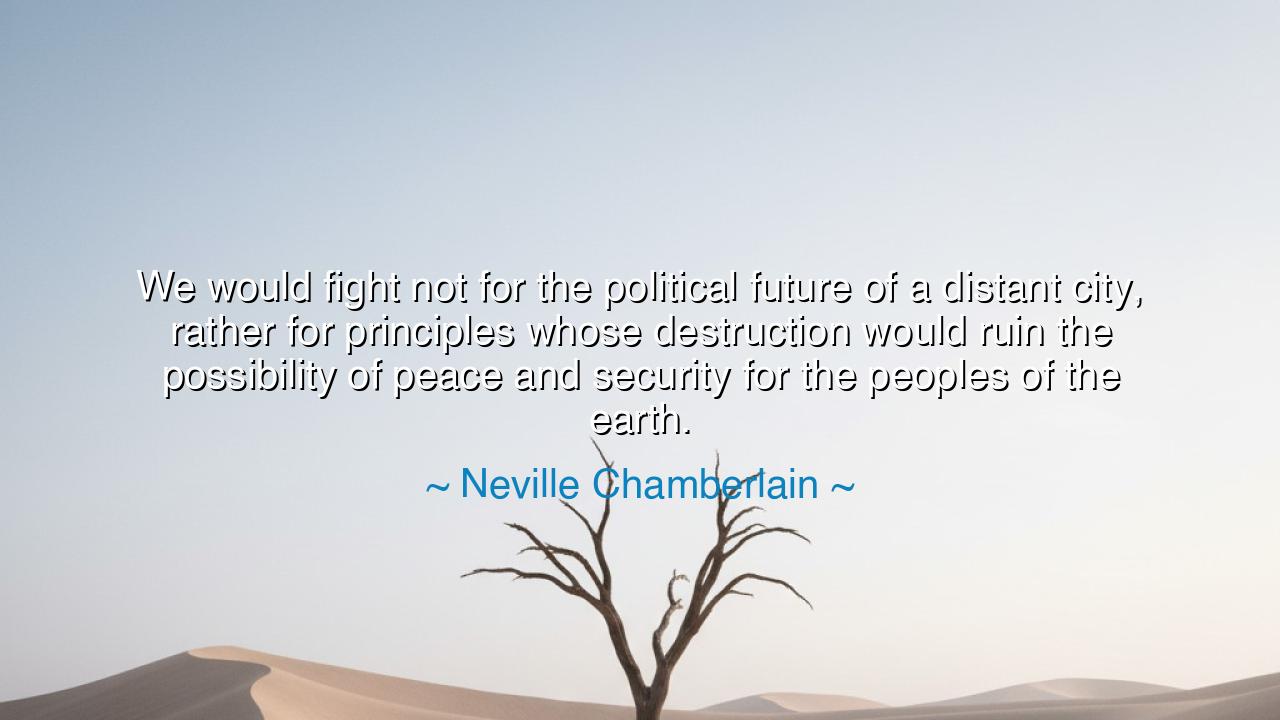
We would fight not for the political future of a distant city
We would fight not for the political future of a distant city, rather for principles whose destruction would ruin the possibility of peace and security for the peoples of the earth.






In the ancient and eternal struggle for justice, there are moments when nations rise not to protect their own interests alone, but to defend the very principles upon which peace and security are built. Neville Chamberlain’s words, "We would fight not for the political future of a distant city, rather for principles whose destruction would ruin the possibility of peace and security for the peoples of the earth," speak to this deeper calling, one that transcends the temporary politics of the moment. It is a call to stand for truth, for justice, and for the values that form the foundation of a just world.
The principles Chamberlain speaks of are not mere ideals to be upheld in theory, but are the living, breathing force that holds together the fragile peace of human civilization. In the ancient world, the Greeks understood this well. They fought not just for territory or fleeting victories but for the greater ideals of democracy and freedom. When the Persian Empire threatened to overrun Greece, the city-states united not to safeguard their own lands alone, but to protect the freedom of the individual and the principles of self-governance. It was a battle for the future of mankind, for the preservation of ideals that had the power to shape the world for generations to come.
Consider the courage of Socrates, who, though he was offered the chance to escape execution, chose to face death rather than compromise his principles. His life, filled with wisdom and dedication to truth, stands as a testament to the idea that some values are worth the greatest sacrifices. Socrates did not fight for personal gain or political power, but for the principles of knowledge, justice, and integrity—principles that would influence generations long after his passing. His example teaches us that the fight for principles is not a battle of the moment, but a struggle that echoes through eternity.
Similarly, the story of Winston Churchill during the Second World War is a modern example of the truth Chamberlain alludes to. Churchill’s stand against Nazi Germany was not solely about the future of England or the British Empire, but about the preservation of freedom, democracy, and the rule of law. In his famous speeches, he rallied his people not with promises of victory, but with the moral clarity that this was a fight for the soul of humanity. Churchill, like Chamberlain, understood that to allow tyranny and injustice to go unchallenged would doom the future of all peoples, not just those of England or Europe.
And so, the lesson here is clear: the fight for principles is the fight for the soul of humankind. It is not enough to defend the borders of one’s own nation or the interests of one’s own people. We must be willing to rise for the greater good, to protect the values that make peace and security possible for all peoples, regardless of nationality. For if we fail to stand for these principles, then we risk the collapse of the very structures that hold our world together. As Martin Luther King Jr. said, "Injustice anywhere is a threat to justice everywhere." When one principle is attacked, it reverberates across the globe.
The practical action here is to be vigilant and committed to upholding the principles of justice, peace, and security in our own lives. While it may not always be possible to engage in grand battles for the future of humanity, each day offers an opportunity to stand for what is right. Whether it is through speaking out against injustice, defending the rights of the oppressed, or simply living a life rooted in the principles of integrity and honor, we must all carry the torch of principle forward. The fight for a better world begins within each of us.
In the end, as Chamberlain reminds us, the true battles are not fought for mere political gain, but for the lasting principles that form the bedrock of a just and peaceful world. Let us honor the wisdom of the ancients and the courage of modern leaders, and let us commit ourselves to the pursuit of justice—always, and at all costs. For in this struggle, we shape the future of not just our own nations, but the future of all peoples on Earth.






AAdministratorAdministrator
Welcome, honored guests. Please leave a comment, we will respond soon